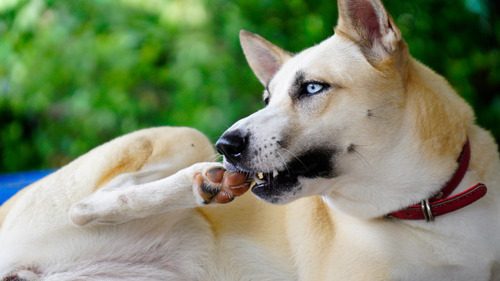Why Is My Dog Chewing Its Paws Excessively?
Your dog’s paws go through a lot each day—from romping through the yard to padding across your living room floor. But when they start chewing at their paws nonstop, it’s hard not to worry. What’s behind this sudden obsession? Whether it’s allergies, anxiety, or something entirely unexpected, excessive paw chewing is your dog’s way of saying something isn’t right. In this blog, we’ll explore the possible reasons your dog may be chewing its paws excessively and why it’s worth paying attention. If you have concerns about your pet’s paw chewing habits, Groveport Canal Animal Hospital in Groveport, OH is here to help. Call us today at (614) 836-3222 or book an appointment online!

Common Causes of Paw Chewing in Dogs
When a dog starts chewing its paws excessively, it is often their way of signaling discomfort. Several factors may contribute to this behavior, and recognizing them early can make a difference in your dog’s comfort and health.
Allergies
Allergic reactions can stem from environmental triggers like pollen, grass, and mold, or food-related allergens such as beef, chicken, or dairy products. When allergies affect the skin, they often cause itchiness and inflammation around the paws, prompting dogs to chew to relieve the irritation. Seasonal allergies tend to flare up at certain times of the year, while food allergies can cause ongoing issues until the specific ingredient is identified and removed from their diet.
Parasites
Fleas, mites, and ticks can also cause a dog to chew its paws excessively. Even a small infestation can trigger significant irritation and itching, especially between the toes. Flea allergy dermatitis, where a dog reacts to flea saliva, is another common cause. If parasites are the issue, you might notice additional symptoms such as redness, scabbing, hair loss, or even the presence of the pests themselves. Regular parasite prevention is a key part of helping to reduce the risk of these problems.
Skin Infections
Both bacterial and fungal infections can lead to discomfort that makes a dog chew its paws excessively. Yeast infections, for example, often thrive in the moist areas between a dog’s toes. These infections can create a strong odor, discoloration, and significant itching, driving the chewing behavior. Secondary infections sometimes develop when the skin has been damaged by scratching or chewing, making prompt veterinary care important for healing.
Behavioral Causes Behind Dog Chewing Paws Excessively
While physical issues are common causes, emotional factors can also contribute to a dog chewing its paws excessively. Stress, anxiety, or boredom can all influence this behavior.
Anxiety and Stress
Dogs experiencing anxiety may engage in repetitive behaviors such as paw chewing. Common triggers include separation anxiety, loud noises, changes in routine, or stressful environments. Chewing can become a self-soothing activity for anxious dogs. Over time, if the anxiety remains unaddressed, the chewing may become a habit, even when the original stressor is no longer present.
Boredom
Lack of mental stimulation or physical activity can also result in a dog chewing its paws excessively. Dogs need regular interaction, playtime, and exercise to stay mentally and physically satisfied. Without enough engagement, they might resort to chewing as a way to pass the time or cope with frustration. Providing toys, puzzles, and regular exercise can help redirect this behavior and offer healthier outlets for their energy.
Medical Conditions That May Cause Dog Chewing Paws Excessively
Sometimes, a dog chewing its paws excessively may point to an underlying medical condition that needs professional attention.
Arthritis or Joint Pain
Dogs experiencing joint discomfort, especially in their paws or legs, may chew the affected area to try to relieve their pain. Arthritis is common in aging dogs but can affect younger pets as well, particularly those with injuries or genetic predispositions. If your dog is older or shows signs of limping, stiffness, or reluctance to walk or climb stairs, joint discomfort could be playing a role in their paw chewing.
Autoimmune Disorders
Autoimmune skin diseases, though less common, can also lead to excessive paw chewing. Conditions like pemphigus or lupus cause the body to attack its own tissues, leading to skin lesions, ulcerations, and severe irritation. These cases typically require diagnosis and management by a veterinarian.
How to Tell If Dog Chewing Paws Excessively Is a Problem
Paw chewing becomes a concern when it goes beyond occasional licking and leads to visible signs of damage or distress. If you notice any of the following, it’s time to consult your veterinarian:
- Persistent chewing that occupies a significant part of the day
- Redness, swelling, or bleeding on the paws
- Bald patches or hair loss between the toes
- Cracked or oozing skin
- Limping or favoring one paw over another
- Foul odor coming from the paws
Ways Veterinarians Diagnose Causes of Dog Chewing Paws Excessively
Identifying the underlying cause of a dog chewing its paws excessively usually involves a thorough examination, detailed history, and diagnostic testing.
Physical Examination
Your veterinarian will carefully inspect the paws, toes, and nails to look for signs of infection, parasites, injuries, or abnormalities.
Allergy Testing
If allergies are suspected, your vet might recommend allergy testing to identify specific triggers. Food trials may also be suggested to pinpoint food-related causes.
Skin Scraping and Cultures
If infection or parasites are potential concerns, your veterinarian may perform a skin scraping or culture to check for mites, bacteria, or fungi. Each diagnostic step brings your dog closer to appropriate relief and management.
Tips to Help Reduce Dog Chewing Paws Excessively
While treatment plans depend on the cause, there are ways to help reduce your dog’s discomfort and prevent worsening symptoms.
- Routine Paw Care: Keeping your dog’s paws clean and dry can help prevent many issues. After outdoor walks, wipe their paws to remove allergens, moisture, and irritants.
- Parasite Prevention: Using year-round parasite prevention protects your dog from fleas, ticks, and mites that could cause intense itching and chewing.
- Mental and Physical Stimulation: Keeping your dog mentally and physically active can reduce boredom-related chewing. Incorporate regular walks, play sessions, and puzzle toys into their routine.
- Regular Veterinary Visits: Routine veterinary care ensures that potential issues are caught early and treated effectively. Preventive care remains one of the best ways to support your dog’s overall comfort and well-being.
Constant paw chewing is more than a frustrating habit—it’s a sign that something is bothering your dog. Paying attention to the signs and seeking veterinary support when needed can help your dog feel more comfortable and enjoy a happier, healthier life. If your dog is chewing its paws excessively, the team at Groveport Canal Animal Hospital is equipped to assess and diagnose your pet’s condition and restore their comfort. Schedule an appointment by calling (614) 836-3222 or book an appointment online today.

